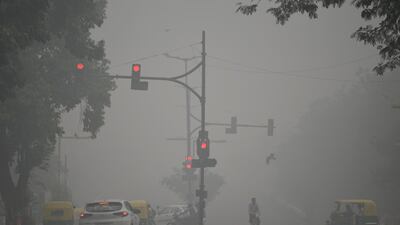India's capital New Delhi was enveloped in heavy, toxic smog on Sunday with the worst pollution levels of recent years.
Hundreds of flights were diverted or delayed as politicians blamed each other for failing to tackle the crisis.
Every winter, the city of 20 million people is blanketed by a poisonous smog of car fumes, industrial emissions and smoke from stubble burning at farms in neighbouring states.
Concentrations of fine particles (2.5 microns or less in diameter) in the air hit the highest level this season, India's System of Air Quality Weather Forecasting and Research said.
The air-quality index for the particulates hit 810 early in the day, well beyond the hazardous zone, said the US embassy in Delhi, which monitors pollution levels.
The recommended World Health Organisation safe daily maximum is a reading of 25.
"Pollution has reached unbearable levels," Delhi Chief Minister Arvind Kejriwal tweeted on Sunday.
Visibility was so poor at Delhi's airports that 37 flights were diverted and hundreds of departures and arrivals delayed, officials said.
The Twenty20 international between Bangladesh and India went ahead as planned on Sunday, with a near-capacity crowd in attendance despite health warnings from government agencies.
"It's actually scary. You can't see things in front of you," protester Jaivipra said at a rally in Delhi on Sunday calling for politicians to do more to curb pollution.
Nurses at the demonstration said they were seeing more people suffering as a result of the smog.
"Patients are coming with more lung and respiratory diseases, like more are affected with asthma," Reshma CM said.
State and federal politicians blamed one another for the conditions.
In a tweet last week, Mr Kejriwal called on the state governments of neighbouring Punjab and Haryana to take action.
"Delhi has turned into a gas chamber due to smoke from crop burning in neighbouring states," he tweeted.
Federal Environment Minister Prakash Javadekar accused Mr Kejriwal of politicising the issue and presenting the two states "in a bad light and as villains".
Schools in Delhi have already been ordered to close until Tuesday, and building work was stopped.
From Monday, there will be an alternating car licence plate programme to reduce traffic.
Global non-profit Vital Strategies' senior vice president for environmental health, Daniel Kass, said while temporary curbs were helpful, they had a limited effect over time.
"They are insufficient to address the most important aspect of air pollution, which is what people live with day to day," Mr Kass said.
He said a range of measures needed to be imposed at local and national levels for air quality to improve.
Apart from changing agricultural practices, Mr Kass said the measures should include more investment in public transport, emission controls on motorcycles, switching electricity generation sources and quicker conversion of home-heating from charcoal to natural gas.
Last year, a UN report found 14 of the world's 15 most polluted cities were in India, with one US study saying pollution was responsible for a million premature deaths every year.










